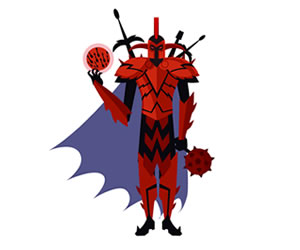Mars was the god of war, death, and protector of the Roman state and its Caesars. He was held as a primary god of the Roman religion and mythology, second only to Jupiter, chief of the gods. Mars is nearly identical to Ares, the Greek god of war.
In early Roman history his role was somewhat different; he protected cattle and was regarded as a god of nature and fertility. He is typically depicted wearing armor and carrying a spear.
Quick Facts about Mars
- His roles in Roman mythology included god of war, protector of Rome, god of nature, fertility, and spring, god of death and protector of cattle.
- His alternate names were Mars Ultor and Mars Gradivus.
- He was the son of Juno, lover of Venus and Rhea Silvia, and father of Phobos, Deimos, Romulus, and Remus.
- His symbols included the spear, wolf, and woodpecker.
- His Greek equivalent was Ares.
Myths and Stories
Myths pertaining to Mars were largely drawn from those of the Greek god Ares. For example, when Jupiter gave birth to Minerva from his head, Jupiter’s wife Juno was jealous. Flora, goddess of flowering plants, gave Juno a magical herb that allowed her to conceive a child without the aid of Jupiter. That child was Mars.
In another myth, Mars played a role in the founding of Rome. The story goes that Numitor, king of a nearby city, had been deposed by his younger brother. The former king’s daughter, Rhea Silvia, was forced to become a Vestal Virgin and take a vow of chastity so she would not bear a child that could someday reclaim the throne. However, she was visited by Mars and bore twin sons, Romulus and Remus.
The new king attempted to drown the boys in the river, but they were carried downstream to the future site of Rome. There, they were suckled by a wolf and later reared by a herdsman and his wife.
Ovid’s Fasti recounts one of the few truly Roman myths, not influenced by Greek culture. In this legend, Mars attempts to seduce Minerva, daughter/wife of Jupiter. Instead, he is tricked into marrying Anna Perenna, a woman of great age.
Worship
The Roman Empire was built and expanded by the conquest of other nations. Romans were proud of their might in warfare. It is no wonder, then, that the god of war was of great significance to their culture; Romans considered themselves sons of Mars.
One temple to Mars was located at the Campus Martius, the training ground and exercise arena of the Roman army, and another near the Porta Capena. At the former, the god was known as Mars Gradivus, “he who proceeds the army in battle.” A sacrarium, or shrine, was located in the former king’s house, called the regia. There were kept the sacred spears of Mars, called hastae Martiae.
When war was declared, the Roman consul would shake the spears, shouting “Mars vigila!” meaning, “Mars, wake up!” Augustus Caesar claimed Mars as the guardian of Roman emperors, calling him Mars Ultor, or Mars the Avenger.
Festivals dedicated to Mars
Festivals to Mars were held in the spring in fall, at the beginning and end of both the agricultural and military season. For this reason, the month of March was named for Mars. Horse races called Equirria were held on February 27 and March 14, and the Feriae Marti on March 1. Weapons and chariots were cleansed during the Quinquatrus and Tubilustrium on March 19 and 23, respectively.
Throughout month of March, the Salii, or “jumpers,” representing Mars along with Jupiter and Quirinus, chanted and performed war dances while wearing old-fashioned armor.
The fall festivals were held in October. On October 15, a festival called the October Horse was held, in which a race between two-horse chariots took place on the Campus Martius. The Armilustrium was held on October 19, on which implements of war were purified and stored for the winter. Once every five years, fertility rites called Suovetaurilia were observed, involving the sacrifice of a pig, sheep, and cow.
Today
Like many ancient deities, Mars’ legacy lives on in the naming of celestial bodies. The planet now called Mars, the forth planet from the sun, has since ancient times been associated with warfare and bloodshed, likely due to the planet’s red appearance. The moons of Mars are named for the mythical sons of Mars and Venus, Phobos, meaning “fear,” and Deimos, meaning “terror.”
More Mars Facts
| Name(s): | Mars |
| Rules over: | War |
| Gender: | Male |
| Symbols: | Spear, Sword |
| Sacred animals: | Wolf, Woodpecker |
| Parents: | Jupiter (Father) and Juno (Mother) |
| Siblings: | Diana, Bacchus, Minerva, Apollo, Vulcan & More |
| Greek Similar: | Ares |
| Norse Similar: | Odin / Tyr |


























